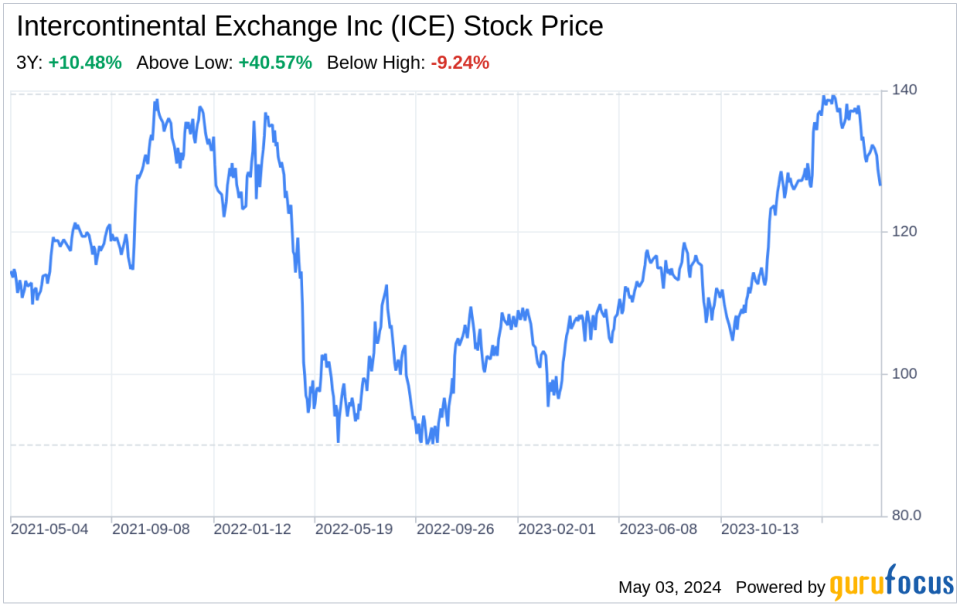Decoding Intercontinental Exchange Inc (ICE): A Strategic SWOT Insight
Intercontinental Exchange Inc (NYSE:ICE) showcases robust financial performance with a significant increase in net income.
ICE's diversified revenue streams across exchanges, fixed income, data services, and mortgage technology position it well for sustainable growth.
Strategic acquisitions and technology investments underline ICE's commitment to expanding its market influence and operational efficiency.
Global economic conditions and regulatory changes pose potential challenges for ICE's diverse business segments.
Intercontinental Exchange Inc (NYSE:ICE), a leading operator of global exchanges and provider of data services, released its 10-Q filing on May 2, 2024, offering a glimpse into its financial performance and strategic positioning. The filing reveals a company that has not only weathered the complexities of the financial markets but has also capitalized on its diverse offerings to deliver a strong financial performance. For the quarter ended March 31, 2024, ICE reported a net income of $783 million, a notable increase from the $674 million reported in the same period the previous year. This financial robustness is further underscored by a comprehensive income of $772 million, despite a slight dip in other comprehensive income due to foreign currency translation adjustments. With a forward-looking approach, ICE continues to leverage its strengths, address its weaknesses, seize opportunities, and mitigate threats in a dynamic market environment.

Strengths
Market Leadership and Brand Reputation: Intercontinental Exchange Inc (NYSE:ICE) stands as a paragon of market leadership, particularly with its ownership of the New York Stock Exchange, a symbol of financial prestige. ICE's brand is synonymous with financial innovation and reliability, attracting a global clientele that relies on its exchanges and data services. The company's leadership in the derivatives market, especially with its ICE Brent crude futures contract, further solidifies its position as a linchpin in the financial ecosystem. This reputation for excellence not only draws in a loyal customer base but also provides a competitive edge in attracting new business and partnerships.
Diversified Revenue Streams: ICE's financial resilience is bolstered by its diversified revenue streams, which span exchanges, fixed income, data services, and mortgage technology. This diversification allows ICE to tap into various market segments, reducing dependency on any single line of business and enabling it to weather sector-specific downturns. The company's ability to generate consistent revenue from its data services, which are essential for market participants, is particularly noteworthy. These services, often subscription-based and billed in advance, provide a stable and predictable revenue source that supports long-term financial planning and investment.
Weaknesses
Exposure to Global Economic Fluctuations: Despite its strong market position, ICE is not immune to the whims of the global economy. The company's operations, particularly in the mortgage technology segment, are sensitive to interest rate changes and economic cycles. The recent uptick in mortgage interest rates has already shown its impact, with reduced consumer demand for mortgages affecting transaction-based revenues. This vulnerability to economic shifts necessitates a robust risk management strategy to navigate the unpredictable financial landscape.
Regulatory Compliance Costs: ICE operates in a highly regulated industry, with oversight from multiple jurisdictions including the U.S., U.K., EU, and Canada. Compliance with an ever-evolving regulatory landscape requires significant resources and continuous adaptation. The costs associated with maintaining compliance can be substantial, and any lapses could result in fines or sanctions that would not only affect financial performance but also damage the company's reputation.
Opportunities
Technological Advancements: ICE has the opportunity to further cement its industry leadership by investing in cutting-edge technology. The company's commitment to innovation is evident in its mortgage technology platform, which addresses inefficiencies in the U.S. residential mortgage market. By continuing to develop and implement advanced technologies, ICE can enhance its offerings, streamline operations, and provide superior service to its customers, thereby driving growth and expanding its market share.
Strategic Acquisitions: ICE's history of strategic acquisitions, such as the purchase of the New York Stock Exchange, demonstrates its ability to successfully integrate new businesses and expand its portfolio. The company's forward-looking strategies suggest a continued focus on acquisitions that complement its core operations. These strategic moves can open up new revenue channels, broaden the customer base, and fortify ICE's position as a diversified financial services provider.
Threats
Competitive Pressure: The financial exchange and data services industry is marked by intense competition. ICE faces the challenge of maintaining its market share against rivals who are also seeking to innovate and expand their offerings. The company must continuously evolve to stay ahead, ensuring that its services remain attractive to existing customers while drawing in new ones. Failure to keep pace with industry developments could result in a loss of competitiveness and market share.
Geopolitical Risks: ICE's global operations expose it to geopolitical risks, including conflicts and trade policies that can disrupt markets and affect trading volumes. Events such as the conflict in Ukraine and tensions in the Middle East can have far-reaching consequences for the financial markets, potentially impacting ICE's revenues and operations. The company must navigate these risks with a proactive approach to risk management and strategic planning.
In conclusion, Intercontinental Exchange Inc (NYSE:ICE) exhibits a strong financial foundation, with a diverse portfolio and a reputation for market leadership. However, it must navigate the challenges posed by economic fluctuations, regulatory demands, competitive pressures, and geopolitical risks. By leveraging its strengths and opportunities while addressing its weaknesses and threats, ICE is well-positioned to continue its trajectory of growth and success in the financial services industry.
This article, generated by GuruFocus, is designed to provide general insights and is not tailored financial advice. Our commentary is rooted in historical data and analyst projections, utilizing an impartial methodology, and is not intended to serve as specific investment guidance. It does not formulate a recommendation to purchase or divest any stock and does not consider individual investment objectives or financial circumstances. Our objective is to deliver long-term, fundamental data-driven analysis. Be aware that our analysis might not incorporate the most recent, price-sensitive company announcements or qualitative information. GuruFocus holds no position in the stocks mentioned herein.
This article first appeared on GuruFocus.
